Meet Chinatown’s Biggest Champion: John Chin
He's been fighting for the neighborhood for decades. Now, with the Sixers angling to build their new arena next door, the head of the Philadelphia Chinatown Development Corporation has more at stake than ever.
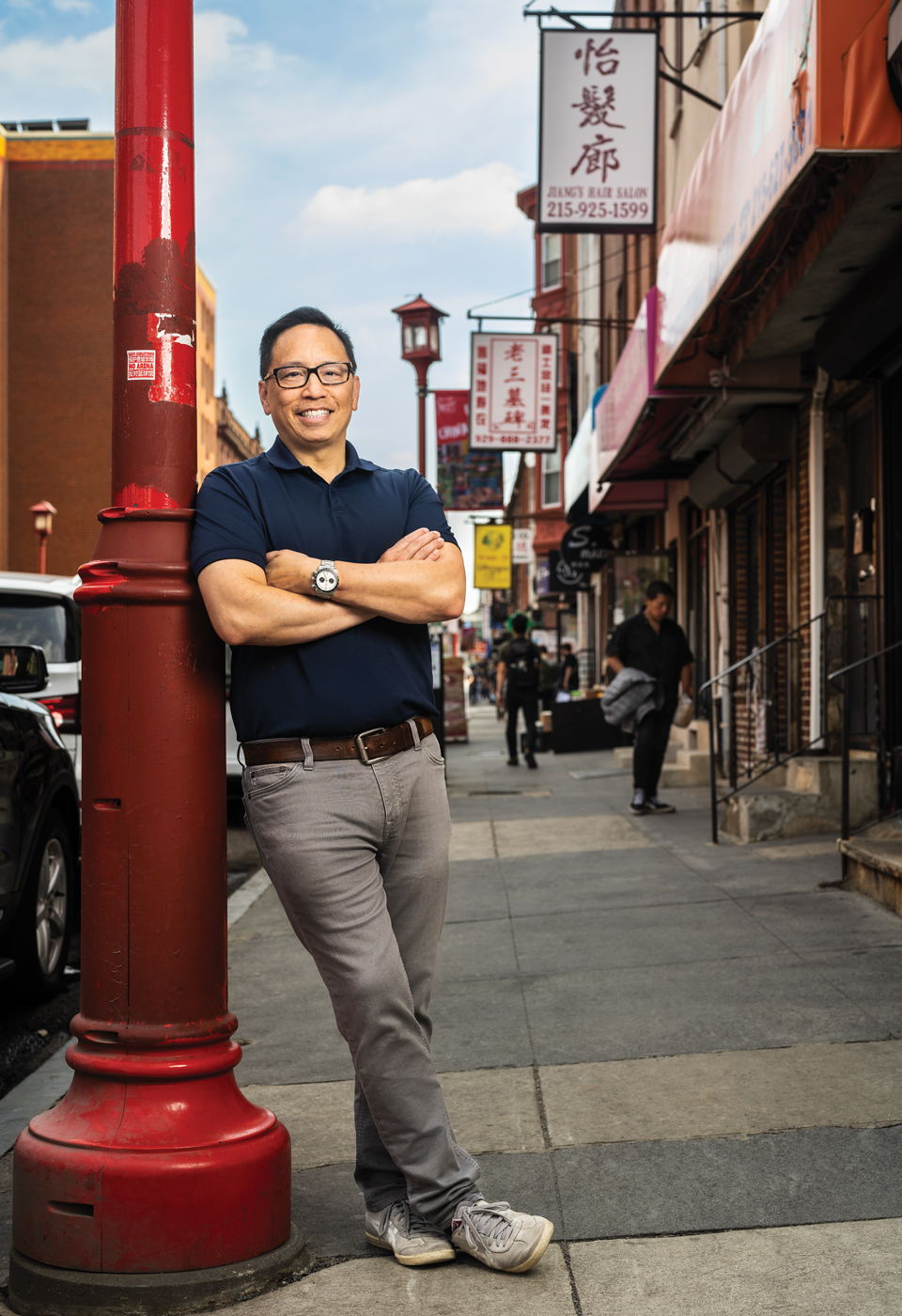
John Chin at 10th and Winter streets in the Chinatown section of Philadelphia / Photography by Linette & Kyle Kielinski
Ever since the Sixers controversially proposed building a huge arena abutting Chinatown, neighborhood son John Chin, the president of the nonprofit whose mission is to “preserve, protect and promote Chinatown,” has had a hard time sleeping at night. But Chin has been at this for more than 20 years. He knows it isn’t the first threat to the community. And he knows it won’t be the last.
John, I heard that during the photo shoot for this interview, people kept coming up to you on the streets of Chinatown to have their picture taken with you. Are you basically the mayor of Chinatown?
[Laughs] Well, I was born and raised in Chinatown, and between that and the work that I do here, you get to know a lot of people. After I was born, we lived on Camac, then 9th, then 10th. A lot of immigrant families who arrived in Philadelphia first lived on Camac Street. It remains a heavily residential street popular with immigrants.
Are you first-generation?
My mom was born in China, in the Guangdong Province in the south. My father’s history is a little more complicated. He was born in New York in 1929, but during the Depression, my grandfather took the entire family on a ship back to China. When my father decided to move to Philadelphia at the age of 34, after leaving China due to the Communists, who made it difficult to earn a living and difficult to find food, he was a U.S. citizen but couldn’t speak any English. Many people in China saw America as the land of possibilities. They would refer to America as gam saan, which means “gold mountain” in Cantonese. They had heard about all the gold rushes.
Why Philadelphia? No gold here.
As is so often the case in Chinatowns, he came here because there was a trail of friends from the old village. He arrived in ’63 to get set up, and my mom followed in ’65. They had met in Hong Kong and got married at the Church of the Holy Redeemer here in Chinatown. He was able to get a job and housing easily.
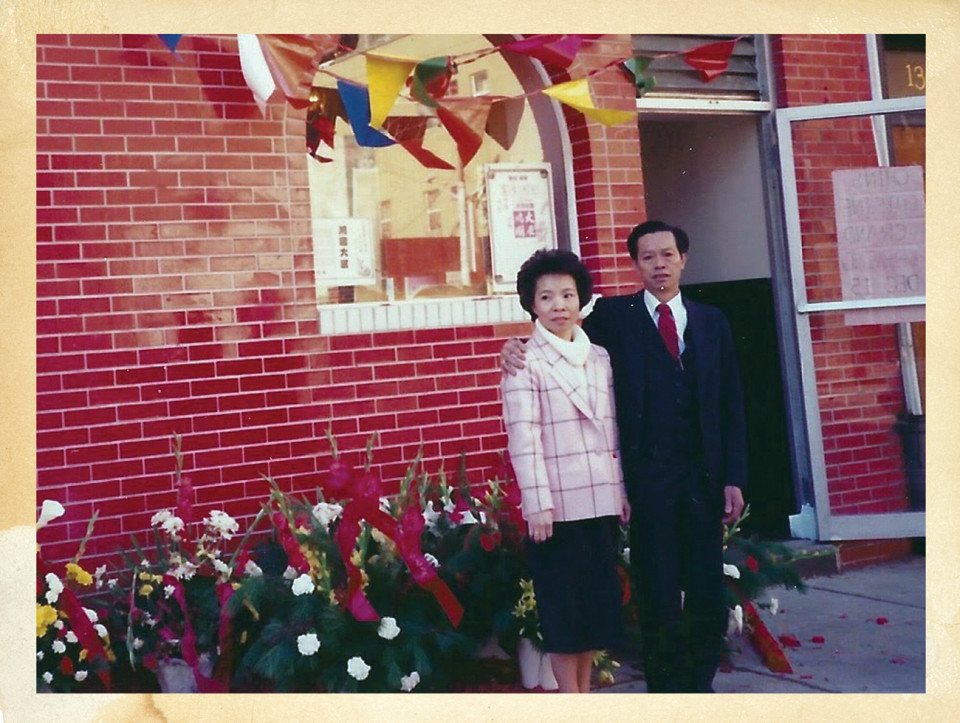
John Chin’s parents in front of their restaurant, Happy Garden. / Photograph courtesy of John Chin
How did you come to head the PCDC?
I’ve been in this position since 2000, and to be honest with you, I just fell into it. The priest at Holy Redeemer knew me and recommended I apply. I had absolutely no previous related experience. I went to Drexel for business and computer sciences and wound up trading equities for a firm in Blue Bell. And.I have been trading stocks since I was 13.
And where in Chinatown do you live now?
I don’t! I live in the Graduate Hospital area. One of the main problems we have in Chinatown is a lack of housing stock to serve the needs of young families, which was, indeed, what forced my parents and us out, and which made it difficult for me to return with my own wife and kids later in life.
What are your earliest memories of Chinatown?
Believe it or not, I have memories from when I was three years old. My parents owned a restaurant called Happy Garden, which opened in 1969, and I remember sleeping under the dishwashing sink on wooden crates of Coca-Cola bottles. Then I learned how to count change for customers at the age of seven. And I have a lot of memories from Holy Redeemer, where I went to school until I was in second grade. But then my parents moved me to Friends Select, at 17th and the Parkway. My sister now tells me it’s because the nuns at Holy Redeemer couldn’t handle me. [laughs] When I went to Friends, because it’s outside of Chinatown, my father made me take kung fu classes to protect myself, since I was an outsider. I don’t think he understood the whole Quakerism/peace thing. [laughs]
Are you bilingual?
Oh yes. My parents made sure we learned Cantonese and pushed us to embrace the culture, values, holiday celebrations. And that was really important. It gives me the confidence I have and the pride in my culture. That can be difficult for Asian Americans in the suburbs to navigate. Europeans blend in. Asian Americans feel like they need to try too hard and wind up losing so much.
If I were to go back to the Chinatown of, say, the 1970s, what would I think of it compared to today?
You would say, “Who the heck would want to raise a family here?” Bars on every corner. So many homeless men on the streets. But growing up there, we had no idea we were living in a “less quality” neighborhood. We were proud of Chinatown.
When we’d go out for a meal growing up, it was always to a local diner, or we’d go into Chinatown for dinner at Shanghai Gardens, which was at 919 Race Street. Never, ever Italian food, because that’s what we cooked at home. Did you have a similar experience?
Exactly. “Why pay to eat something I can cook better at home?” Our parents would take us to American restaurants — the Stouffer’s on Chestnut, the Rusty Scupper in Cherry Hill, Horn & Hardart at 11th and Market, and a cafe at 12th and Ludlow.
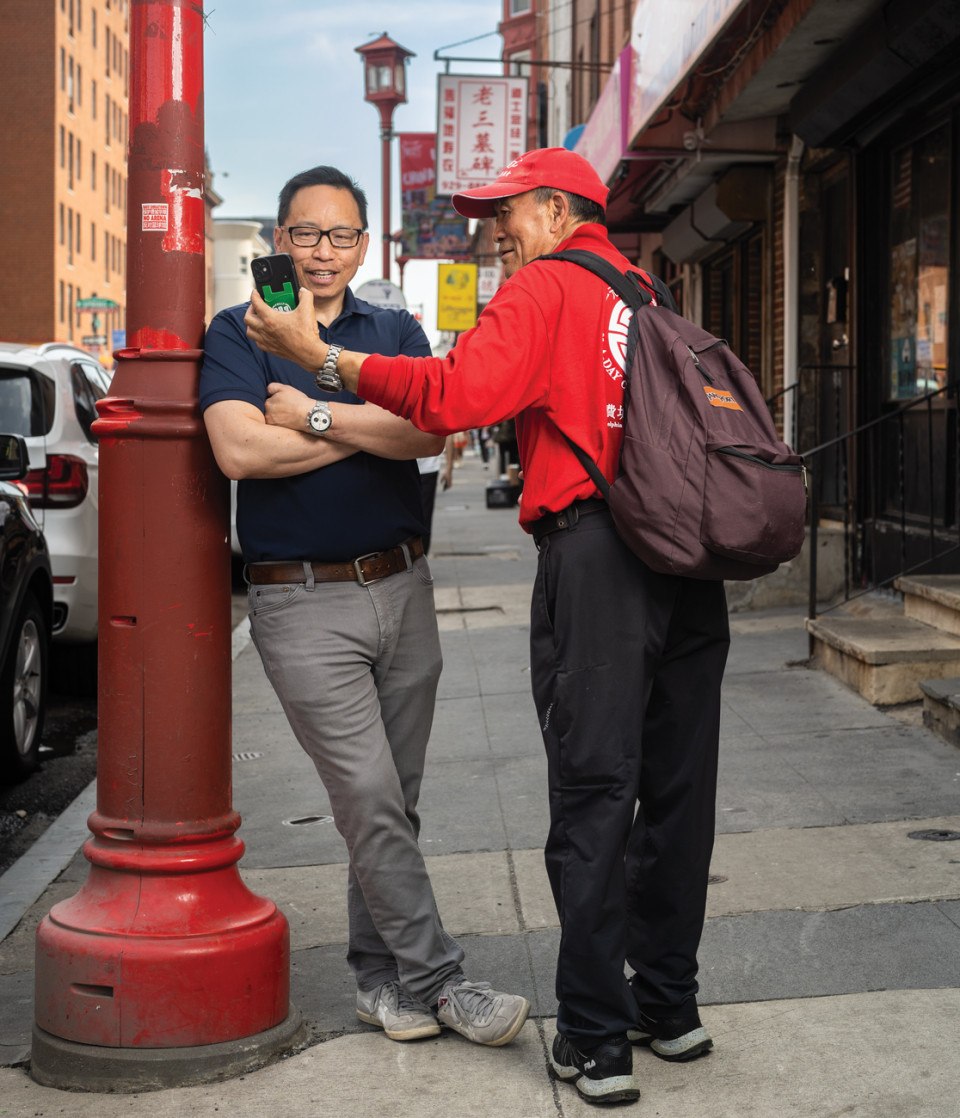
We’re coming up on the 50th anniversary of Best of Philly next month, and I recall seeing a Best of Philly sign in the lobby of Ho Sai Gai from the late ’70s. What’s the oldest standing restaurant in Chinatown today?
Ooh. It’s got to be Ho Sai Gai, or David’s, right across the street. And Vietnam Restaurant and Sang Kee have been there for a long time as well.
Mmm, David’s. Those dumplings!
With that ginger-scallion sauce!
Exactly. As you know, David’s is still takeout-only after reopening following COVID, which is surprising.
I know. But secretly, a bunch of Chinatown OGs meet up the first Thursday of the month upstairs at David’s. We have to sneak in. It’s a scene. A real riot. So much “old neighborhood guy” banter.
Ten years ago or so, I was coming down the elevator from a meeting in the restaurant on top of the hotel at 11th and Arch. A couple was in the elevator with their kids, the kids were crying hunger, and the dad says, “I think there’s a Hard Rock down the street.” I asked them if they liked Chinese food, and they said yes. And I pointed out that they were in Chinatown. They said they had no idea. Can’t Chinatown do more to put itself on the map?
Yes. We look back, and there certainly should have been more effort. More could have been done to promote Chinatown. You have to remember that Chinatown is hidden behind the massive Convention Center. Regional people know Chinatown. But sometimes the tourists and the conventioneers don’t. I think we’ve worked on it and slowly built up our capacity to be a visitors’ destination. That said, we don’t want to become a “tourist attraction.” We don’t want to be seen as “exotic.”
Tell me about the demographics of Chinatown.
Well, we’re 49 percent Asian. And of that, mostly Chinese. Post-Vietnam War, you had a lot of Southeast Asian refugees coming here, but there just wasn’t the housing stock in Chinatown, which is why you have such a large Southeast Asian community in South Philadelphia.
How long has there been a Chinatown in Philadelphia?
What we know is that it was 1871 when the first Chinese laundry business opened here. That was at 913 Race Street. That’s the first Chinese-owned business we can document. This area was what you would call Skid Row, similar to other Chinatowns. Boston’s Chinatown was founded in the red-light district, Manhattan’s in the run-down Bowery. The list goes on. Chinatowns wind up establishing themselves in places undesirable to others.
Of course I want to get to the Sixers arena, but that proposal isn’t the first time Chinatown has fought outside development, correct?
Almost every seven years, something happens. So many projects. The Phillies wanted to build a baseball stadium at Broad and Spring Garden. Then they proposed 11th and Vine. The government wanted to build a federal detention center at 8th and Vine, which is inside the boundaries of Chinatown. We said no. It’s now at 7th and Arch, just east of Chinatown. Also, trains used to come into Reading Terminal above the Market in a train shed, but due to the construction of the Convention Center — which we also opposed — they had to reroute all the trains; they condemned buildings along 9th Street to build a commuter-rail tunnel. Oh, and they wanted to put casinos here, too. And then, of course, there’s the Vine Street Expressway project. We really had to fight just to get it how it is today, which is still dangerous and physically dividing Chinatown.
We are an authentic hub for Asian American culture. The question I don’t have the answer to is: Are these event-goers coming here to experience the authenticity that we offer? Or are they going to want more sports bars?”
The city has embarked on the so-called Chinatown Stitch, which is capping the Expressway to alleviate that division and also to beautify the area. Are you satisfied with the Stitch?
We’re ecstatic. It will transform the area and has the potential to spur development north of Vine Street, so our commercial corridor can expand northward. Right now, the “main street” in Chinatown is Race Street. But we’re looking into whether Vine Street can be seen as the main street. This would make many more people want to be in Chinatown.
Seems huge.
It is. You know what it also does? It repairs this damaged psyche of all these different projects forced on Chinatown. After a while, it becomes, “What is it about Chinatown that people don’t value us? What is wrong with us?” The truth is that Chinatown is a community worth investing in, and the Stitch is doing that.
But not all investment in the immediate area is a good thing, I gather. Are you and the PCDC absolutely, diametrically opposed to the Sixers arena going where it’s proposed to go, under any and all circumstances?
That is precisely the position. We have many, many concerns. Some of the primary ones are traffic and parking. The impact of the arena on these things could be very harmful to our own commercial corridor. They say that people will take public transportation there. We don’t know that to be true. Also, they like to compare it to similar situations in other cities, like the Barclays Center in Brooklyn. Do you realize how small and narrow the sidewalks are here compared to there, and to many other cities with downtown arenas?
Interesting. Yes, the sidewalks really are small.
And what happens to all the SEPTA buses coming down Market Street and the numbered streets during the events? What happens to our local businesses that these days rely so heavily, post-COVID, on food-delivery services like UberEats? How will the traffic and parking problems impact the bottom line for those restaurants that need the drivers to be able to get to them? The “solutions” the arena backers have offered are purely theoretical. They are not based in reality. And we have no reason to be confident they would be applicable in real-life situations that would present themselves should the arena happen.
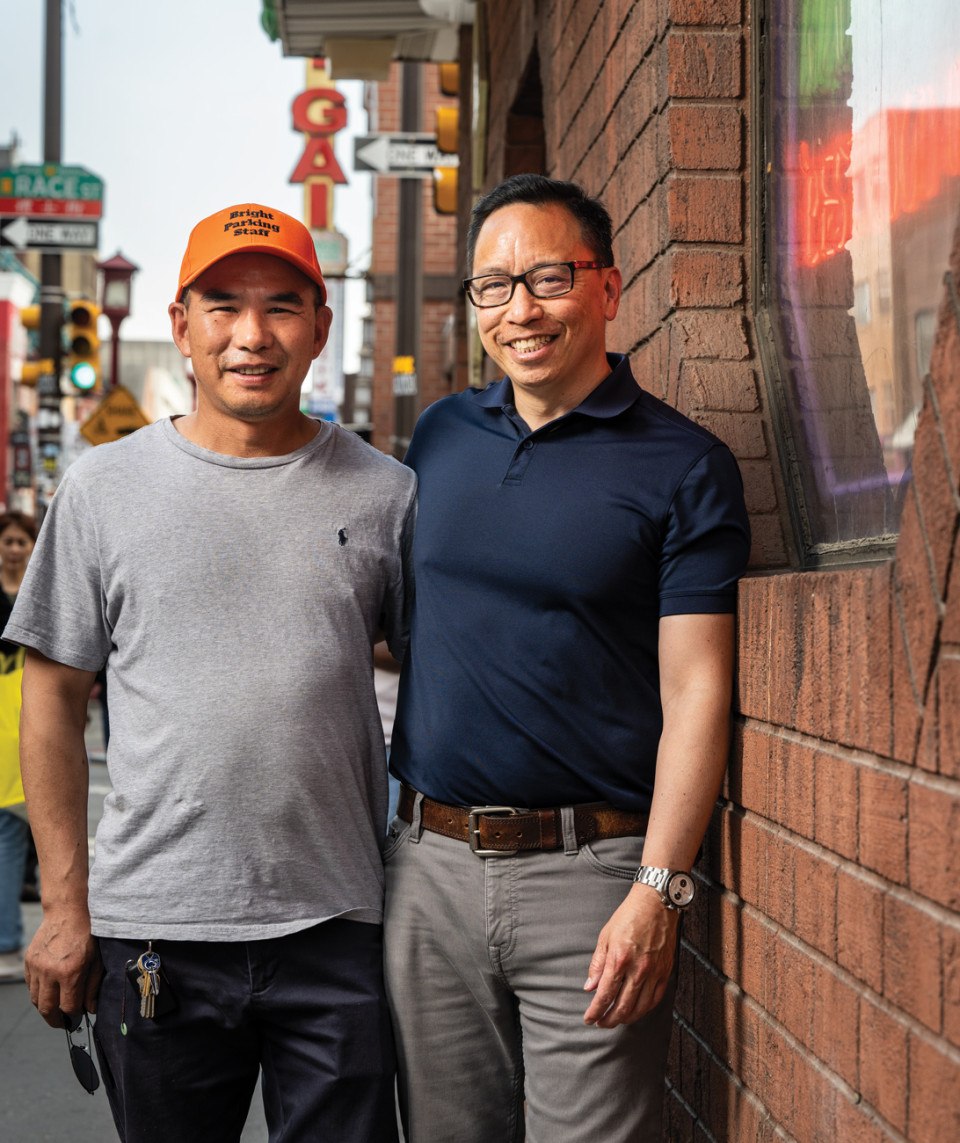
But at the same time, it’s easy to imagine casual observers saying, “Wait … wouldn’t thousands of people coming to see a basketball game or concert benefit the businesses in Chinatown?”
Listen to me: Chinatown offers something that no other neighborhood in Philadelphia offers. We are an authentic hub for Asian American culture. The question I don’t have the answer to is: Are these event-goers coming here to experience the authenticity that we offer? Or are they going to want more sports bars? More athletic apparel shops? More sandwiches, less dumplings? I fear we would become a Chinatown like the one in Washington, D.C. It’s right near the arena, but it now has very, very little substance.
But money talks, right, John? Isn’t this thing going to be built, just because the forces behind it are so big and so wealthy?
That’s my worry — $1.6 billion is a lot of money to spread around.
When you agreed to this interview, I was reminded of an online story I wrote on January 31, 2020, titled, “My Friends Refuse to Eat in Chinatown Due to Coronavirus — and They’re Not the Only Ones.” That was a month and a half before the state shut down. Can you characterize for me the impact that COVID had on Chinatown, even before everything closed in March 2020?
It was devastating. From the end of December 2019 until the end of January 2020, Chinatown saw a 40 percent decline in business because of these fears people had about coming to Chinatown to eat and also because of this anti-Asian hate that was spreading. It was just a horrible period of time, and it became worse. But we have bounced back. We are still struggling, in part because of that missing lunch crowd, with so many people still working from home.
That work-from-home tide seems to be turning a bit. More and more companies in Center City have started bringing workers into the office. And the mayor has ordered all city employees to get back to in-person work by July 15th. Maybe all of that will help.
I do have a lot of hope for the future. I think we can come back all the way.
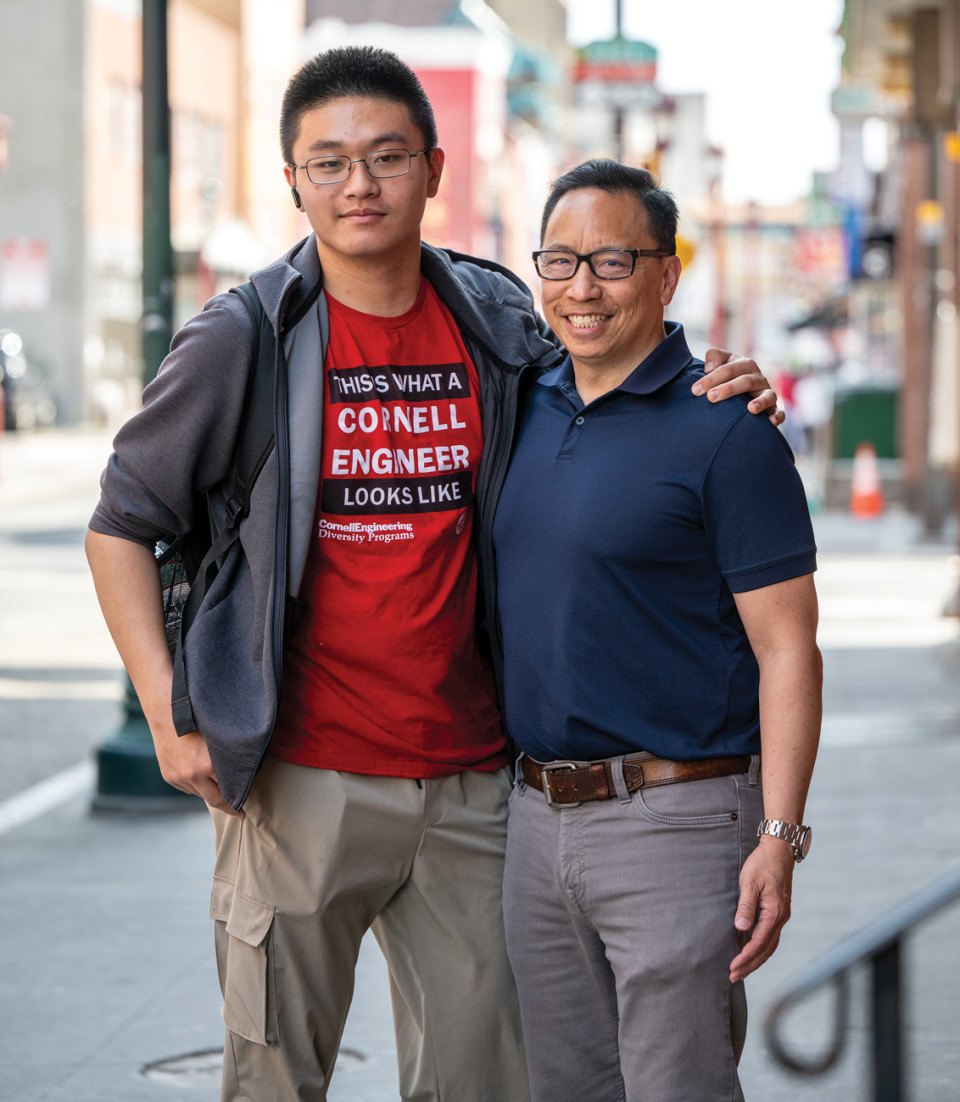
Okay, I’m a tourist visiting Philadelphia for 48 hours. Give me the ultimate Chinatown itinerary.
You’re going to get me in trouble! [laughs] I would send you to EMei Restaurant, where you should taste the spiciest Sichuan food they have on the menu. You have to go to Ting Wong, for the best roast duck in the neighborhood. And I would also send you to the Tuck Hing grocery store on 10th Street, which might be the longest-running business in Chinatown. Very traditional foods and herbs. You might not find anything to suit your palate, but you can say you were there. What I am not going to say is anything about bubble tea. I think we have enough bubble tea shops. [laughs] Even Starbucks is selling bubble tea now!
John, it’s been great speaking with you. But going back to one of your earlier answers, I have to say, I’m a little surprised you don’t live in the neighborhood you represent. What would it take to get you to move back?
A place in Chinatown where nobody knows where I live! I need to be able to walk down the street and enjoy myself. People see me as a fixer, and I can’t be a fixer 24/7. Everybody wants to come to me for help. And I’m happy to help. But living here is a much different story. I need a life!
This interview has been edited for length and clarity.
Published as “The Mayor of Chinatown” in the July 2024 issue of Philadelphia magazine.


